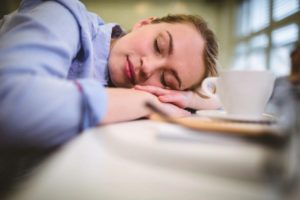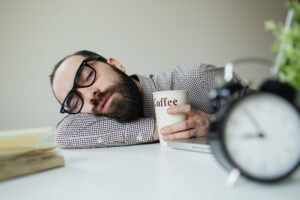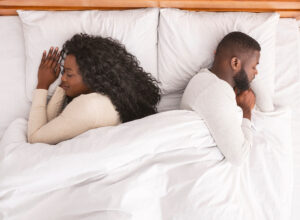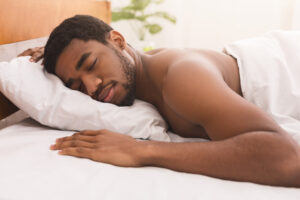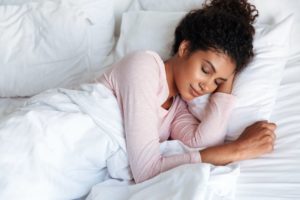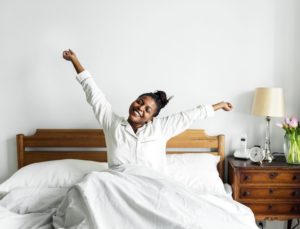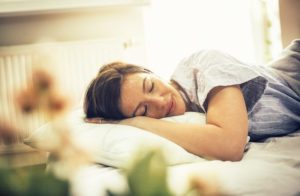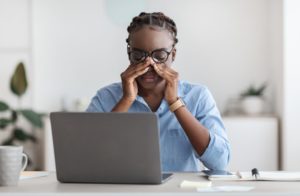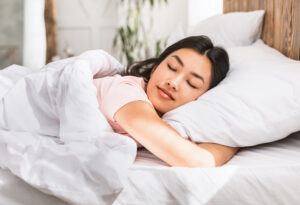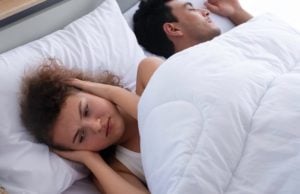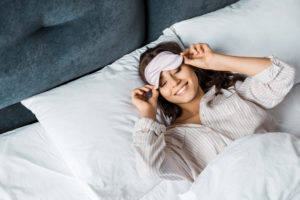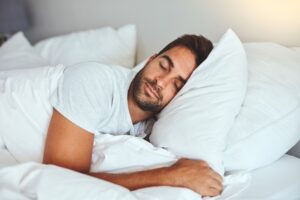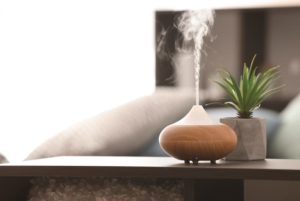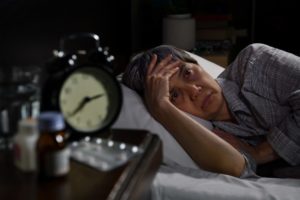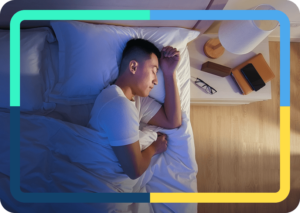When you buy through our links, we may earn a commission. Products or services may be offered by an affiliated entity. Learn more.
Waking Up At 4am Every Day? Here’s Why
- Waking up in the middle of the night tends to occur with mental and physical conditions and often increases with age.
- Factors that keep people waking up in the middle of the night may intersect with natural body rhythms like your circadian rhythm or sleep cycle.
- Insomnia, stress, aging, hormones, medications, and pain are among the possible factors impacting your nightly sleep.
You might wonder, why do I keep waking up at 4 a.m.? Waking up during the night is fairly common, with over 35% of people waking up during the night at least three times per week. Environmental factors, such as a partner snoring, a change in the room temperature or a loud car driving by, may wake you up momentarily from sleep. Usually, most people fall back asleep easily.
If you are waking up at the same time each night or waking up frequently throughout the night and struggling with falling back asleep, it could be due to factors beyond your environment. Waking up frequently at night often occurs alongside physical and mental disorders, and tends to increase with age. Learn possible reasons you might wake up during the night, and how to determine if your awakenings warrant a doctor’s visit.
Is Your Disrupted Sleep a Problem?
An inability to stay asleep can be indicative of larger issues. Answer three questions to understand if you should be concerned.
Why Do I Wake Up at the Same Time Each Night?
A variety of factors could cause a person to wake up each night when they would prefer to be asleep. These factors might intersect with natural bodily rhythms, such as your circadian rhythm or sleep cycle, to make waking up at a specific time more likely.
The circadian rhythm is an internal 24-hour clock that causes different hormones to release at different times of day to either promote sleep or energize the body and mind. We also cycle through four sleep stages as we sleep, and wake up more easily at certain points of this cycle than others. Combined with these existing rhythms, other factors that cause people to wake up at night might result in regularly waking up around the same time.
Insomnia
If you struggle with falling or staying asleep, you may be experiencing insomnia. Common symptoms of insomnia include:
- Trouble falling asleep
- Waking up during the night
- Waking up too early in the morning and being unable to fall back asleep
- Not sleeping soundly
- Not sleeping enough despite having enough time and the right environment for sleep
- Feeling tired during the day
Insomnia can be caused by a variety of factors :
- Shift work
- Napping during the day
- Using technology in bed
- Inconsistent bedtimes
- Smoking, alcohol, and drugs
- Caffeine late in the day
- Pregnancy
- A bright or noisy room
- Physical pain
- A lack of exercise
If you think you may be struggling with insomnia, there are a variety of treatment options, including cognitive behavioral therapy , lifestyle changes, and sleep medications.
Stress
Excessive stress can negatively impact almost all of the body , affecting the musculoskeletal, respiratory, cardiovascular, and gastrointestinal systems. Stress can hurt your quality of sleep as well. A study of medical students found that those who reported higher stress levels also reported poorer quality of sleep .
One study found that an increase in sleep quality helped increase a person’s ability to cope with stress effectively. Sleep and stress likely affect one another, with poor sleep impacting your ability to handle stress, and stress impacting your ability to sleep well. Cognitive behavioral therapy for insomnia can help break this cycle.
Aging
Your nighttime awakenings might be a normal part of the aging process. Around middle age, adults begin to wake up more often at night and experience shortened sleep duration due to circadian rhythm changes. Older adults are also more likely to take longer to fall asleep at night and wake up too early in the morning, then struggle to fall back asleep. Both cognitive behavioral therapy for insomnia and strategic light exposure have been found to help.
Hormones
Hormonal changes may prompt you to wake up during the night. The various stages of women’s health, such as pregnancy , perimenopause , and menopause , are all marked by hormonal changes and sleep disturbances.
People who are pregnant may also have disrupted sleep due to the physical changes in their body. If you are pregnant, try using a maternity pillow to make sleeping on your side feel more comfortable. If you are perimenopausal or menopausal and experiencing body temperature fluctuations, try investing in cool bedding or a fan to help you sleep more comfortably.

Medications
Certain medications may negatively impact sleep or cause nighttime awakenings.
- Beta-Blockers: Primarily used to treat hypertension, these medications can impact sleep by suppressing melatonin production in the body. Since melatonin promotes sleep, this suppression can make sleeping soundly difficult. Research suggests that supplementing with melatonin may counteract the effect beta-blockers have on sleep.
- Diuretics: Diuretics help lower blood pressure by reducing the amount of water in your body. However, you may find that you urinate more frequently while taking them. Frequent nighttime wakings to use the restroom can disrupt your sleep cycle and may leave you struggling to fall back asleep.
- Antidepressants: Antidepressants help treat depression as well as various other mental health disorders. However, trouble sleeping is a common side effect of antidepressants.
If you have concerns about your current medications, it is important to discuss them with your doctor.
Lifestyle
Lifestyle choices may also impact your ability to stay asleep through the night. For example, one study found that people who do not maintain a set bedtime report more sleep-related problems .
People who smoke are also more likely to report poorer sleep quality than those who do not. Additionally, some people wake up to smoke a cigarette during the night, further impacting their sleep quality . Research suggests regular, vigorous exercise may help you quit the habit if you smoke.
Pain
Attaining adequate sleep is especially important when you have chronic pain , but it can be difficult since chronic pain often causes nighttime awakenings that lead to inadequate sleep. Relieving pain and any related mood issues, such as anxiety and depression, can help with related sleep problems.
When to Talk to Your Doctor
Waking during the night could be due to a variety of factors and may resolve with simple lifestyle changes, such as maintaining a consistent bedtime and avoiding electronic devices and caffeine in the evening.
However, if you continue to wake up during the night despite making changes and these awakenings prevent you from attaining adequate sleep, you might want to reach out to your doctor. Your doctor can help determine if there is an underlying sleep disorder, health issue, or mental health problem causing you to wake up during the night.
Medical Disclaimer: The content on this page should not be taken as medical advice or used as a recommendation for any specific treatment or medication. Always consult your doctor before taking a new medication or changing your current treatment.

Still have questions? Ask our community!
Join our Sleep Care Community — a trusted hub of sleep health professionals, product specialists, and people just like you. Whether you need expert sleep advice for your insomnia or you’re searching for the perfect mattress, we’ve got you covered. Get personalized guidance from the experts who know sleep best.
References
21 Sources
-
Ohayon, M. M. (2008). Nocturnal awakenings and comorbid disorders in the American general population. Journal of Psychiatric Research, 43(1), 48–54.
https://pubmed.ncbi.nlm.nih.gov/18374943/ -
National Institute of General Medical Sciences. (2022, March 11). Circadian rhythms., Retrieved August 21, 2021, from
https://www.nigms.nih.gov/education/fact-sheets/Pages/circadian-rhythms.aspx -
National Institute of Neurological Disorders and Stroke. (2019, August 13). Brain basics: Understanding sleep., Retrieved August 21, 2021, from
https://www.ninds.nih.gov/health-information/public-education/brain-basics/brain-basics-understanding-sleep -
National Heart Lung and Blood Institute. (2020, March 2). Insomnia., Retrieved August 21, 2021, from
https://www.nhlbi.nih.gov/health-topics/insomnia -
A.D.A.M. Medical Encyclopedia. (2021, April 1). Insomnia. MedlinePlus., Retrieved August 21, 2021, from
https://medlineplus.gov/ency/article/000805.htm -
Williams, J., Roth, A., Vatthauer, K., & McCrae, C. S. (2013). Cognitive behavioral treatment of insomnia. Chest, 143(2), 554–565.
https://pubmed.ncbi.nlm.nih.gov/23381322/ -
American Psychological Association. (2018, November 1). Stress effects on the body., Retrieved August 21, 2021, from
https://www.apa.org/topics/stress-body -
Almojali, A. I., Almalki, S. A., Alothman, A. S., Masuadi, E. M., & Alaqeel, M. K. (2017). The prevalence and association of stress with sleep quality among medical students. Journal of Epidemiology and Global Health, 7(3), 169–174.
https://pubmed.ncbi.nlm.nih.gov/28756825/ -
Blaxton, J. M., Bergeman, C. S., Whitehead, B. R., Braun, M. E., & Payne, J. D. (2017). Relationships among nightly sleep quality, daily stress, and daily affect. The Journals of Gerontology. Series B, Psychological Sciences and Social Sciences, 72(3), 363–372.
https://pubmed.ncbi.nlm.nih.gov/26307483/ -
Li, J., Vitiello, M. V., & Gooneratne, N. S. (2018). Sleep in Normal Aging. Sleep Medicine Clinics, 13(1), 1–11.
https://pubmed.ncbi.nlm.nih.gov/29412976/ -
Fiorentino, L., & Martin, J. L. (2010). Awake at 4 am: Treatment of insomnia with early morning awakenings among older adults. Journal of Clinical Psychology, 66(11), 1161–1174.
https://pubmed.ncbi.nlm.nih.gov/20845423/ -
Sedov, I. D., Cameron, E. E., Madigan, S., & Tomfohr-Madsen, L. M. (2018). Sleep quality during pregnancy: A meta-analysis. Sleep Medicine Reviews, 38, 168–176.
https://pubmed.ncbi.nlm.nih.gov/28866020/ -
Delamater, L., & Santoro, N. (2018). Management of the perimenopause. Clinical Obstetrics and Gynecology, 61(3), 419–432.
https://pubmed.ncbi.nlm.nih.gov/29952797/ -
Gava, G., Orsili, I., Alvisi, S., Mancini, I., Seracchioli, R., & Meriggiola, M. C. (2019). Cognition, mood and sleep in menopausal transition: The role of menopause hormone therapy. Medicina (Kaunas, Lithuania), 55(10), 668.
https://pubmed.ncbi.nlm.nih.gov/31581598/ -
Scheer, F. A., Morris, C. J., Garcia, J. I., Smales, C., Kelly, E. E., Marks, J., Malhotra, A., & Shea, S. A. (2012). Repeated melatonin supplementation improves sleep in hypertensive patients treated with beta-blockers: A randomized controlled trial. Sleep, 35(10), 1395–1402.
https://pubmed.ncbi.nlm.nih.gov/23024438/ -
National Institute of Diabetes and Digestive and Kidney Diseases. (2017, October 2). Diuretics. LiverTox: Clinical and Research Information on Drug-Induced Liver Injury.
https://pubmed.ncbi.nlm.nih.gov/31644115/ -
Duncan, M. J., Kline, C. E., Rebar, A. L., Vandelanotte, C., & Short, C. E. (2016). Greater bed- and wake-time variability is associated with less healthy lifestyle behaviors: A cross-sectional study. Zeitschrift Fur Gesundheitswissenschaften = Journal Of Public Health, 24(1), 31–40.
https://pubmed.ncbi.nlm.nih.gov/27110481/ -
Purani, H., Friedrichsen, S., & Allen, A. M. (2019). Sleep quality in cigarette smokers: Associations with smoking-related outcomes and exercise. Addictive Behaviors, 90, 71–76.
https://pubmed.ncbi.nlm.nih.gov/30368021/ -
Peters, E. N., Fucito, L. M., Novosad, C., Toll, B. A., & O’Malley, S. S. (2011). Effect of night smoking, sleep disturbance, and their co-occurrence on smoking outcomes. Psychology of Addictive Behaviors: Journal of the Society of Psychologists in Addictive Behaviors, 25(2), 312–319.
https://pubmed.ncbi.nlm.nih.gov/21443301/ -
Zvolensky, M. J., Rosenfield, D., Garey, L., Kauffman, B. Y., Langdon, K. J., Powers, M. B., Otto, M. W., Davis, M. L., Marcus, B. H., Church, T. S., Frierson, G. M., Hopkins, L. B., Paulus, D. J., Baird, S. O., & Smits, J. (2018). Does exercise aid smoking cessation through reductions in anxiety sensitivity and dysphoria? Health Psychology: Official Journal of the Division of Health Psychology, American Psychological Association, 37(7), 647–657.
https://pubmed.ncbi.nlm.nih.gov/29708388/ -
Finan, P. H., Goodin, B. R., & Smith, M. T. (2013). The association of sleep and pain: An update and a path forward. The Journal of Pain, 14(12), 1539–1552.
https://pubmed.ncbi.nlm.nih.gov/24290442/


